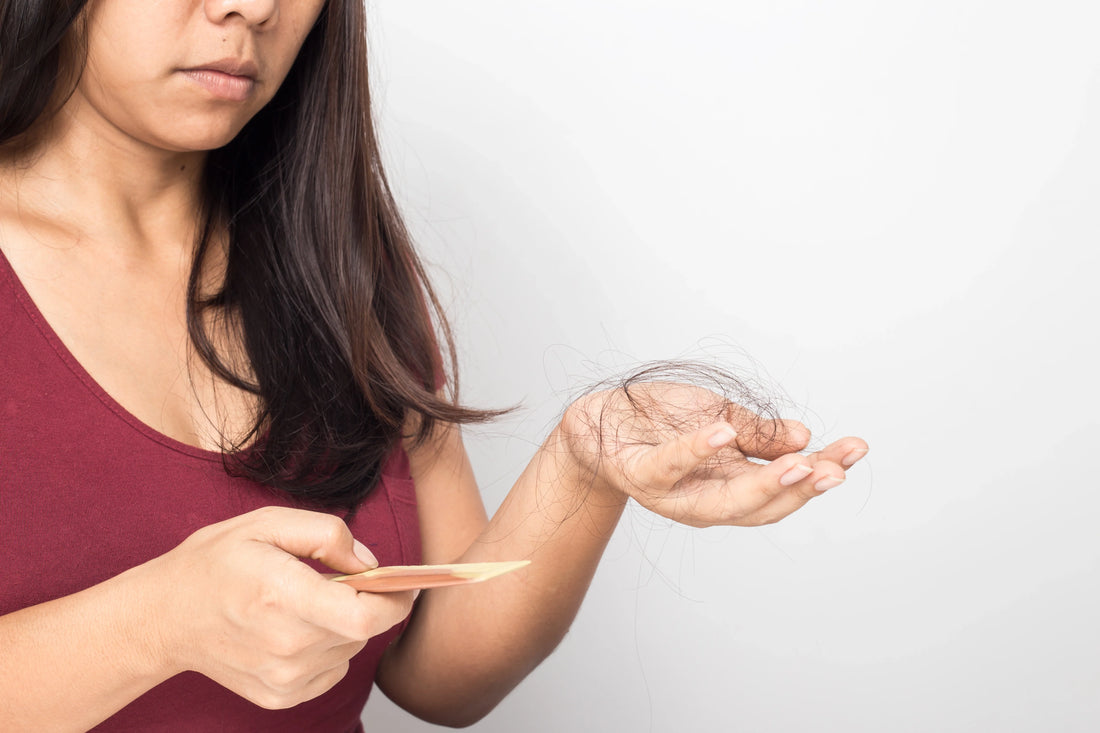
Which Vitamin Deficiency Causes Hair Loss? Signs, Causes & Solutions
Share
Vitamin Deficiency and Hair Loss: What You Need to Know
Hair loss can feel overwhelming — it’s not just about appearance, it impacts confidence and self-esteem too. While genetics and ageing play a role, vitamin deficiency is a hidden but powerful cause that many people overlook.
Your hair relies on essential vitamins to stay strong, thick, and healthy. When these nutrients run low, follicles weaken, leading to thinning, shedding, and slow regrowth. The good news? In many cases, the damage can be reversed with the right diet, supplements, and treatment.
In this article, you’ll discover which vitamins are most closely linked to hair loss, how to spot deficiency symptoms, and practical steps to restore healthy growth..
Can Vitamin Deficiency Really Cause Hair Loss?
Yes — lacking the right vitamins can disrupt your hair growth cycle and trigger noticeable thinning or shedding. Hair follicles need a steady supply of nutrients to stay active and produce keratin, the protein that makes up your strands.
When vitamins like D, B12, Biotin (B7), and Iron run low, follicles often stay in the resting phase longer, slowing regrowth and weakening existing hair.
The body also prioritizes vital organs like the heart and brain over hair growth. That means when nutrients are scarce, your hair follicles are the first to suffer. According to Dr. Ayesha Malik, a certified trichologist, “Hair is one of the first areas where nutritional imbalances show up.
Deficiencies can lead to excessive shedding, brittle strands, and slower regrowth, but the good news is that many of these effects are reversible with the right treatment.” — but the good news is, restoring vitamin balance can often reverse the damage.
How Does Vitamin Deficiency Lead to Hair Loss?
When your body lacks key vitamins, hair follicles weaken — and the results show quickly:
- Slower Growth: Without enough nutrients, the body struggles to produce new hair cells, delaying regrowth.
- Increased Shedding: Weak follicles can’t hold strands firmly, causing more hair to fall out.
- Thinning & Brittleness: Existing hair becomes fragile, leading to breakage and overall thinning.
Research confirms that deficiencies in Vitamin D, B12, Biotin, and Iron are strongly linked to thinning hair and alopecia. Clinical studies also show that restoring these nutrients often improves hair density and reduces shedding.
It’s not just about hair — deficiencies can also cause fatigue, weak nails, mood changes, and even bone pain. If you notice both hair loss and these symptoms, it’s worth getting a blood test.
Once deficiencies are identified, targeted diet changes and supplements can help restore healthy growth.
Which Vitamin Deficiency Causes the Most Hair Loss?
When it comes to hair loss, certain vitamins and minerals are more strongly linked than others. While genetics, hormones, and stress also play a role, research consistently shows that deficiencies in these nutrients can directly impact follicle health and hair growth.
1. Vitamin D – The Follicle Activator
Vitamin D helps activate hair follicles and stimulate new growth. Low levels are often found in people with telogen effluvium (temporary shedding) and alopecia areata (patchy hair loss).
Evidence: Studies reveal that correcting Vitamin D deficiency can restore healthier hair density and reduce shedding.
Source: Korybalska, K., et al. (2017). "The role of vitamin D in hair loss and other dermatological disorders." Journal of the European Academy of Dermatology and Venereology.
PubMed - Study
2. Biotin (Vitamin B7) – The Hair Strengthener
Biotin supports keratin production, the protein that makes up hair. Deficiency, though rare, can cause brittle, thinning strands.
Evidence: Biotin supplementation improves hair strength in people with proven deficiencies, but offers little benefit if your levels are already normal.
Source: Trüeb, R. M. (2009). "Biotin and the hair: facts and myths." Journal of Cosmetic Dermatology.
PubMed - Study
3. Vitamin B12 – The Oxygen Supplier
Vitamin B12 is crucial for red blood cell formation, which delivers oxygen and nutrients to hair follicles. Deficiency can cause thinning and premature greying, especially in vegans or those with absorption issues.
Evidence: Supplementation often restores hair health within 3–6 months when deficiency is corrected.
Source: Yamaguchi, M., et al. (2007). "Effects of vitamin B12 on hair loss." The Journal of Nutritional Biochemistry.
PubMed - Study
4. Iron (Ferritin) – The Growth Supporter
Iron stores (ferritin) supply oxygen to follicles. Low levels starve hair of nutrients, leading to excessive shedding — particularly in women with heavy periods or restrictive diets.
Evidence: Hair growth typically improves within 3–6 months of iron supplementation once ferritin levels rise above 30 ng/mL.
Source: Bergfeld, W. F., et al. (2006). "Iron deficiency and hair loss: A review of the literature." Journal of the American Academy of Dermatology.
PubMed - Study
5. Zinc – The Follicle Repair Mineral
Zinc helps with hair tissue repair and oil gland function. A lack of zinc can result in fragile, easily broken strands and delayed regrowth.
Evidence: Research links zinc deficiency to shedding and weak follicles, with supplementation improving both hair strength and shine.
Source: Sharquie, K. E., et al. (2002). "Zinc deficiency and its relationship with hair loss." Journal of Dermatology.
PubMed - Study
Quick Comparison: Vitamin Deficiencies Linked to Hair Loss
|
Vitamin/Mineral |
Main Role |
Deficiency Symptoms |
Impact on Hair |
How to Fix It |
|
Vitamin D |
Activates hair follicles |
Fatigue, low immunity |
Telogen effluvium, alopecia areata |
Sun exposure, supplements, fatty fish |
|
Biotin (B7) |
Supports keratin production |
Brittle nails, skin rashes |
Brittle, thinning hair |
Eggs, nuts, biotin supplements (if deficient) |
|
Vitamin B12 |
Makes red blood cells |
Fatigue, tingling, weakness |
Hair thinning, premature greying |
Meat, dairy, B12 supplements (especially for vegans) |
|
Iron (Ferritin) |
Transports oxygen |
Fatigue, pale skin, dizziness |
Excess shedding, slow regrowth |
Red meat, lentils, iron supplements |
|
Zinc |
Tissue repair, oil gland support |
Weak immunity, slow healing |
Hair breakage, dull strands |
Oysters, seeds, zinc supplements |
Can Natural and Holistic Approaches Help With Hair Loss?
Yes — while medical treatments like supplements and injections can correct deficiencies, holistic approaches often provide the extra support your hair needs to thrive. Think of it as creating the best possible environment for your hair to regrow and stay strong.
How Can Diet Support Hair Growth?
Your plate is the first place to start. A nutrient-rich diet naturally replenishes vitamin levels and supports healthy follicles. Focus on:
- Iron sources like spinach, red meat, or lentils to fuel oxygen delivery to follicles.
- Vitamin A foods such as carrots and sweet potatoes to keep scalp oils balanced.
- Protein-rich meals (eggs, beans, lean meats) to provide the building blocks for keratin.
- Zinc-rich foods like seeds, chickpeas, or seafood to strengthen strands.
A simple example: grilled salmon with spinach and quinoa — packed with protein, omega-3s, iron, and zinc in one meal.
What Lifestyle Habits Can Reduce Hair Loss?
Small daily habits can make a big difference in protecting your hair:
- Manage stress with yoga, meditation, or even short walks.
- Quit smoking — toxins directly weaken follicles.
- Massage your scalp to boost circulation.
- Protect hair from heat, sun, and harsh styling.
Are Natural Supplements Worth Trying?
In some cases, yes. Natural options can complement medical treatment and support hair from within:
- Biotin to boost keratin production.
- Omega-3s/fish oil to reduce inflammation and nourish follicles.
- Herbal oils like rosemary or peppermint to stimulate scalp circulation.
Always check with your healthcare provider before adding new supplements — especially if you’re already on medication.
Bottom line: Holistic changes won’t replace medical treatment if you have a serious deficiency, but they can create the perfect foundation for your hair to recover and grow stronger.
When Should I See a Doctor for Hair Loss?
A little shedding every day is normal, but not all hair loss should be ignored. In some cases, thinning or sudden shedding can point to a deeper health concern. Spotting the warning signs early can help you take action before the problem worsens.
What Are the Red Flags to Watch For?
If you notice any of the following, it’s time to consult a doctor or dermatologist:
- Persistent shedding: Hair loss lasting weeks or months, or shedding more than 100 hairs a day.
- Patchy bald spots: Sudden, round patches may signal alopecia areata, an autoimmune condition.
- Rapid thinning: Sudden drop in hair density could be linked to thyroid disease or PCOS.
- Low energy & fatigue: May point to iron, Vitamin B12, or Vitamin D deficiencies.
- Nail changes: Brittle, ridged nails alongside hair loss often mean nutritional or hormonal imbalance.
- Scalp pain or inflammation: Itching, burning, or tenderness could indicate infection or scalp disorders.
Which Medical Conditions Can Trigger Hair Loss?
Several health issues can directly cause or worsen hair thinning:
- Thyroid disorders (hypothyroidism or hyperthyroidism)
- Polycystic Ovary Syndrome (PCOS)
- Alopecia areata (autoimmune patchy hair loss)
- Iron deficiency anemia
- Stress-related telogen effluvium
- Hormonal changes (pregnancy, menopause, birth control)
- Scalp infections (fungal, seborrheic dermatitis, psoriasis)
When Is It Time to Seek Medical Advice?
If lifestyle changes, stress reduction, or diet improvements aren’t stopping the shedding, don’t wait. A healthcare provider can:
- Run blood tests to detect deficiencies or hormone imbalances
- Diagnose scalp conditions
- Recommend treatments tailored to your needs — from supplements and medication to advanced therapies
Bottom line: Early diagnosis makes a huge difference. The sooner you get checked, the faster you can identify the root cause and protect your hair health.
Frequently Asked Questions
Hair loss often leads to a lot of “what ifs.” Here are answers to some of the most common questions about vitamin deficiencies and hair health.
What is the best vitamin for hair loss?
There isn’t one single miracle vitamin. Healthy hair growth depends on a combination of nutrients — especially iron, zinc, vitamin D, vitamin B12, and biotin. Rather than guessing, it’s best to get your levels tested and address any deficiencies with guidance from a healthcare provider.
Can a lack of vitamin B12 really cause hair loss?
Yes. Low B12 levels can slow down hair follicle cell production, leading to thinning and excess shedding. If you’re feeling unusually tired along with hair loss, B12 deficiency might be the culprit. A simple blood test can confirm this, and supplementation usually helps.
How much biotin should I take if I’m losing hair?
Most studies suggest 2.5–5 mg per day may support hair health, but mega-dosing doesn’t necessarily mean faster growth. Biotin supplements are most effective if you’re actually deficient. If your levels are normal, you may not see much benefit. Always check with your doctor first.
Will hair grow back after vitamin deficiency?
In many cases, yes — especially if caught early. Once the deficiency is corrected, hair follicles often return to their normal cycle. However, long-term deficiencies can sometimes cause permanent damage, so don’t delay getting tested if you suspect nutrient gaps.
Conclusion
Hair loss linked to vitamin deficiency is more common than most people realize — but the silver lining is that it’s often treatable and reversible. By spotting the signs early, correcting deficiencies, and making dietary or lifestyle changes, you give your hair the best chance to recover.
Medical treatments can play a big role, but a holistic approach works best: balanced nutrition, stress management, scalp care, and professional guidance.
Remember — you’re not alone in this. With the right support and treatment plan, healthier, fuller hair is within reach.
